
























In this issue we include a special report of San Antonio 2011, the most recent Mennonite Brethren National Youth Convention held April 16-19 in San Antonio, Texas. Prior to SA2011, negative reaction to the announcement that Shane Claiborne would be one of two keynote speakers threatened to overshadow other features of the four-day convention.
While some students were motivated to attend SA2011 because Claiborne would be speaking, others stayed home because congregations and parents were concerned about what the 35-year-old Christian activist and author would say. Many students who did attend were aware of the controversy over Claiborne, and so they listened curiously and carefully to what he had to say.
So what did Claiborne say? Was his message appropriate for Mennonite Brethren youth?
“

Connie Faber Editor
So what did Claiborne say? Was his message appropriate for Mennonite Brethren youth? Was it in keeping with our core values? Claiborne shared speaking duties with Paula Simpson-Parry, a Scottish woman now living in Texas who worked with Youth For Christ in Great Britain. While the majority of youth leaders (60 percent) agreed that SimpsonParry’s sermons were challenging, Claiborne’s messages clearly hit the spot, with 95 percent of youth leaders saying Claiborne was challenging.
Listening to Claiborne, I was struck by how similar his message was to Simpson-Parry’s—and these speakers were about as different from one another as they could be. Their message wasn’t complicated and it wasn’t new, but it hit home: God loves you. Don’t leave this room without responding to God’s offer of salvation. Use your gifts and abilities to serve your community, your neighbors, the world; let God’s flood flow out of you and into the lives of others.
It wasn’t only what Claiborne said but how he said it. Claiborne quickly established rapport with his audience. The students’ response was so obvious and so positive that Claiborne agreed to a question and answer session with students following his first sermon. The questions they asked ranged from tough to silly and Claiborne answered each question graciously, thoughtfully and respectfully.
Bringing Claiborne to SA2011 created an unexpected flood of controversy. Was it worth it? I don’t know how the codirectors and planning team would answer that question. But there is no doubt in the minds of many of us present at SA2011 that Claiborne’s message was one our teens needed to hear.















Jeff Gowling

Someone had better tell Jesus that it is taboo to talk to Christians about their money. He doesn’t seem to get it. In fact he talks more about money and possessions than he does about heaven and hell combined! And in Matthew 6:19-24, he’s at it again.
Jesus shares two hugely significant principles related to money in these verses:
1. There is perhaps no clearer and no more measurable indicator of where our heart truly is. It’s not church attendance. It’s not participation in an outreach event. What does Jesus say is an indicator of where your heart is?
“For where your treasure is, there your heart will be also” (v.21).
2. In the area of money, there is a battle for our souls. “No one can serve two masters. Either he will hate the one and love the other, or he will be devoted to the one and despise the other. You cannot serve both God and Money” (v.24). Could those battle lines be any clearer? You can’t kind of love both. It’s God versus your money. You will be mastered by one or the other.
The tithe was an Old Testament law to ensure that Israel was putting God first with their finances. Ten percent of everything was to be given to God (Lev. 27:30-32). In fact, God declared that if they did not bring the tithe (what I like to call the divine portion) they were robbing him (Mal. 3:8-9).
When Jesus comes along in the New Testament, he seems to indicate that our generosity with our money should dwarf the Old Testament law standard of the tithe. He doesn’t tell the rich young ruler to sell 10 percent, he tells him to sell it all and follow him (Luke 18:22). When the church is established in the book of Acts, they didn’t sell 10 percent of their stuff. It says, “Selling their possessions and goods, they gave to anyone as he had need” (Acts 2:45).
I appreciate the practical advice of Randy Alcorn in his book The Treasure Principle: “It’s unhealthy to view tithing as a place to stop, but it can still be a good place to start.”
So how are you doing in this critical area? Is God getting at least 10 percent of your income?
Recently I asked our church financial secretary to crunch some numbers and estimate how many of our people seem to be tithing (10 percent). It’s not an exact science but she determined that just under 15 percent appeared to be tithing. In light of Jesus’ words in Matthew 6, could it be that 85 percent of my church family is choosing their money over God? Ouch.
I’m convinced that materialism and the pursuit of the American Dream is the most prevalent idol in our culture today. I urge you, slay that enemy in your life. Give generously to God and watch his grace abound to you (2 Cor. 9:6-8).
Jeff Gowling is lead pastor at The Bridge Bible Church in Bakersfield, Calif.
“No one can
serve two masters. Either he will hate the one and love the other, or he will be devoted to the one and despise the other. You cannot serve both God and Money” ~ Matt. 6:24
June / July 2011
Volume 74 • Number 3
Connie Faber EDITOR
Myra Holmes ASSISTANT EDITOR
Shelley Plett GRAPHIC DESIGNER
Connie Faber
COVER PHOTO of youth from Grace Bible Church, Gettysburg, SD
The Christian Leader (ISSN 0009-5149) is a gathering place for the people, passions and mission of U.S Mennonite Brethren. The Christian Leader is published bimonthly by the U.S. Conference of Mennonite Brethren Churches. However, the opinions expressed here are not necessarily those of the church as a whole.
COPYRIGHT The articles printed in the Christian Leader are owned by the CL or by the author and may not be reprinted without permission. Unless noted, Scripture quotations are from the New International Version.
READER PARTICIPATION Letters to the editor should be 300 words or less and on one subject. Letters must be signed and include the writer’s city and state. Letters will be edited for clarity, appropriateness and length. Letters will be published, as space allows, unless marked, “Not for publication.” Readers interested in contributing essays for In My Humble Opinion and First Person should contact the editor. Freelance article submissions are welcome; a SASE must accompany articles.
SUBSCRIPTIONS $10 for six issues and $20 for 12 issues ($15, $30 in Canada; all other countries $25 for six issues); $1.50 per copy
CORRESPONDENCE: All correspondence, including subscription questions and address updates, should be addressed to Christian Leader Box 155, 107 N. Main, Hillsboro, KS 67063-0155 Phone: 620.947.5543
E-mail: christianleader@usmb.org
MEMBERSHIP The Christian Leader is a member of the Evangelical Press Association and Meetinghouse, an association of Mennonite and Brethren in Christ editors.
POSTMASTER Send address changes to Christian Leader, Box 155, Hillsboro, KS 67063. Periodicals postage paid at Hillsboro, Kansas.

The Christian Leader is published by


Ed Boschman USMB Executive Director ebed@usmb.org
Larry Nikkel, National Board of Faith and Life chair, and Ed Boschman, USMB executive director, coauthored this column on behalf of the NBFL.
In a previous Conference Call on behalf of our National Board of Faith and Life (BFL), we shared our intention to address an apparent gap between what we say we believe in our Confession of Faith, (our talk) and our apparent actual belief (our walk).
While we believe that our national family is unified around our mission statement which declares that “we partner as one family, serving one Lord, on one mission, for the transformation of individuals, families and communities,” we also believe that we need integrity in our statements of belief. That is why our Board of Faith and Life, the leadership team entrusted with responsibility for the theological oversight of our Confession of Faith, wishes to engage the constituency on subjects pertinent to what it means to be authentic kingdom citizens in today’s world.
It is noteworthy to observe the subject of Jesus’ last passionate conversation with his Father prior to his suffering and death. He prays that all his disciples would live in unity and “be one” just like he and his Father are one. That oneness would verify that Jesus was really sent by God and provide the power of authenticity to the church. If we are not unified in our faith and in our lives, our witness loses credibility.
Some believe that seeking unity, especially on the issue of how Christians relate to the state and respond to the government’s military engagements, is a goal beyond our reach. If our approach is to make immediate judg-
ments about those whose views represent a position other than our own on these matters, then that is likely correct, for that would mean that we have only winners and losers. But because we believe that unity in the church is possible, our approach must be to engage in a biblical and Spirit-directed process that will lead to unity on those things upon which we will agree.
Our short-term goal is to engage all levels of our constituency in a process that promotes the safe expression of opinions and attitudes on what we believe Jesus and the Scriptures teach us on how we live in our world as faithful followers of Jesus. That initiative will likely begin with a significant and reliable survey to gather broad-based information about beliefs and practices and will be followed by significant processes of leading and listening.
We will model resistance to the temptation of prematurely staking out our positions and working to win support for those positions and are asking that everyone do the same. We will pray and live expectantly of ways in which the Holy Spirit will guide and direct to strengthen our conference and in ways that will confirm that we are all serious followers of Jesus.
We are committed to reaching conclusions around which we can be unified and which will guide us in our preaching, teaching and living. Our ultimate goal is a commitment to the pursuit of peace in all times and in all situations, for that is what we believe the Prince of Peace desires—peace with God, peace with ourselves, peace in our families, peace in our churches, peace in our work places, peace in our communities, peace in our country and peace in the world.
Our short-term goal is to engage all levels of our constituency in a process that promotes the safe expression of opinions and attitudes on what we believe Jesus and the Scriptures teach us on how we live in our world as faithful followers of Jesus.
Jose Elizondo


On Jan. 6, 2011, I died. Doctors completed a quadruple bypass heart surgery Jan. 4, which was deemed a success. My wife, Mary, and my sons greeted me as I woke from the anesthesia, and my healing seemed on schedule.
But two days later, without warning, my heart stopped for 30 seconds. As nurses worked furiously to revive me, I had an encounter with God that brought me closer to him and gave me a mission for my remaining days.
I was traveling down a pitch-black hallway or tunnel. I was upright but not walking. Rather, I was in midair, being pushed by a tremendous force toward a speck of light in the distance. I felt like I was a goner. I thought of my wife and children; I hadn’t even had a chance to say good-bye. I started praying: “Lord Jesus, I need your help. Please help me.” The force pushing me began to weaken and finally came to a stop.
I heard a majestic voice, so full of power and authority it could only be God, saying, “Go back and
tell my people to get their act together and to start getting serious.”
Then I recognized the voices of nurses as they frantically worked to revive me, and I drifted to sleep. When I awoke, I called one of the nurses to my bedside and asked forgiveness for harsh words I’d said to her the day before. I thanked her for saving my life.
She took my face in both her hands and told me, “Jose, that wasn’t me, that was God Almighty. He sent you back to us, because he still has a lot of work for you to do for him here.” She was right; my life has forever changed. I’ve been given a message for God’s people. It’s up to me to deliver that message. If I don’t, I’m exercising disobedience.
As I’ve meditated on the message given me, I believe God used such simple words so that I could understand the message completely. I believe it is a message for all who fall short of full obedience— myself included. One of the nurses commented that, since I was a “bishop,” a church leader, I should already have it all together, but there’s always ample room for growth. The message is for all of us. We all fall short.
I visit so many churches, and I see so many injustices. Jesus looks at us just as he looked over Jerusalem so long ago, saying, “...and how often I have longed to gather your children together, as a hen gathers her chicks under her wings, but you were not willing” (Luke 13:34). It seems to me that we have some tremendous leaders and many dedicated people, but we also have the other type, too—those who are putting out only superficial roots, not going deep enough to be able to get those roots into the Rock.
From now on, my messages will call us to full obedience, because that is what really pleases God. When we believe in God, we’re going to obey him. This is my commission, my mandate.
I would have never, never imagined that something like this would happen to me. But it did. As a result, I have grown closer to God, and I know that life is really, really precious—and eternal life is even more so.—Jose Elizondo as told to Myra Holmes
Elizondo is the Pacific District Conference associate district minister. He lives with his wife, Mary, in Sanger, Calif.

A new group of graduates was part of the Fresno Pacific University commencement May 7. Those earning master’s degrees through Fresno Pacific Biblical Seminary, formerly MB Biblical Seminary, joined graduates of the traditional undergraduate and master’s programs. FPU is the Mennonite Brethren university headquartered in Fresno, Calif. The seminary became a school of the university in February 2010, and May marked the completion of the first full academic year since the merger. These were the first joint ceremonies. Of the 426 graduates, 218 were from bachelor’s degreecompletion programs and 208 were from traditional undergraduate and graduate programs, including the 21 seminary graduates, who earned master’s degrees. Degree completion graduates studied at FPU regional centers in Bakersfield, Visalia and North Fresno.
Gary Wall, district minister of the Pacific District MB Conference, gave the commencement address, “What Does This Mean?” Wall earned his bachelor’s degree from FPU and his Master of Divinity from MB Biblical Seminary.—FPU
Valerie Rempel, Fresno, Calif., provided the May 21 commencement address for Tabor College, the Mennonite Brethren school in Hillsboro, Kan., with a second campus in Wichita, Kan. Rempel is a Tabor alumna and associate dean and associate professor of history and theology at Fresno Pacific Biblical Seminary, the MB seminary in Fresno, Calif.
Tabor President Jules Glanzer says the selection of a former student to speak is intentional. “I am committed to inviting distinguished Tabor alumni to return to campus to speak at our commencement,” he says. “I want our graduates to experience Tabor alumni who have a record of significant accomplishments and are involved in a life of service. Dr. Rempel is such an alumna.”
There were 113 candidates for the Bachelor of Arts degree from the Hillsboro campus, and six candidates for the Bachelor of Science degree, 29 candidates for the Bachelor of Science in Nursing and nine Master of Business Administration candidates from Tabor College Wichita.—TC
César García, a Colombian Mennonite Brethren pastor, church planter and educator has been appointed as General Secretary-elect of Mennonite World Conference. García will join MWC staff in August for a period of transition with Larry Miller, current general secretary, and begin his new responsibilities Jan. 1, 2012. With García’s appointment, the MWC head office will move from Strasbourg, France, to Bogotá, Colombia. García, who was chair of the Iglesias Hermanos Menonitas de Colombia (Mennonite Brethren Churches of Colombia) from 2002 to 2008, is currently completing master’s studies at Fresno Pacific Biblical Seminary, Fresno, Calif. He also serves as secretary of the MWC Mission Commission and as a member of MWC’s task force on the creation of a new network of service ministries. In addition, he has been active in inter-Anabaptist and ecumenical endeavors in Colombia.—MWC

The Pacific District Conference Board of Faith and Life has restored Jim Holm’s ordination credential and unanimously affirms Holm for future ministry among the Mennonite Brethren. Holm, who served as president of MB Biblical Seminary, resigned in 2008 due to his involvement in an extramarital relationship and has been in involved in a restoration process for the past 21⁄2 years.
“We respect Jim for the humble manner in which he has engaged with the Lord and with us during this process,” said the PDC in its March 29 announcement. “He has accepted responsibility, been open and forthright, been responsive to counsel and has made his marriage a priority.” The PDC also affirms Holm’s wife, Shirley, and requests ongoing prayer for the couple and their future ministry.
The statement, posted at www.usmb.org/christian-leader, includes a message from Holm, in which he expresses gratitude to the Board of Faith and Life, to the MB constituency and to his wife.—PDC
92% of Americans agree that fathers make a unique contribution to their children’s lives 1/3 ofAmerican children and teens live absent their biological father 72.2% of the U.S. population see fatherlessness as the most significant family/social problem facing America
Source: National Center for Fathering

5 minutes with...
BJ Heizelman of Buhler, Kan., has been to every Mennonite Brethren National Youth Convention since Glorietta ’75. In 1983, newly married and graduated from Tabor College, BJ and his wife Denise began as youth sponsors at Community Bible Church, Olathe, Kan. They now serve the youth at Buhler (Kan.) MB Church.
How did you get started in youth ministry?
Denise: After Tabor we looked into Christian Service, but it seemed that God wasn’t opening that door for us, so we made the decision we would be lay leaders wherever we went.
BJ: We started going to Community Bible Church, and five months later we were taking the youth group to Estes ’83.
So you two have been youth sponsors continuously since 1983?
Denise: Yes, and now we have youth grandbabies. Russ Friesen was a senior in our first Olathe MBY and now he is the youth pastor there and his daughter is a freshman.
Is it hard to balance youth ministry with your personal life?
BJ: We just take our vacations with the youth. Summer camp and conferences have been our vacations. Some people think it’s a sacrifice, but it’s just our ministry.
Denise: Our kids have always been a part of the ministry.
How have youth changed?
BJ: It seems we have to entertain more. We still keep spiritual Bible study in our meetings, and we have worked at more spiritual nourishment, but there is still a want for entertainment.

What should churches do to help their youth?
BJ: Students need to feel wanted. Even if they look bored in the service, students do want to be there. Church should keep a balance of incorporating them and their needs in the service—and not just on youth Sunday.
Interview by Kathy Heinrichs Wiest
The U.S. Mennonite Brethren Leadership Board has created a new national staff position, director of development, to be responsible for coordinating public relations, designing and implementing fund development programs and strengthening connections with churches and partner agencies. USMB Executive Director Ed Boschman says that adding a director of development will allow other staff to focus energy in areas of gifting and ministry priority. With the creation of this position, the number of denominational staff positions expands to nine, including two new part-time positions: social media coordinator, currently filled by Justin Salters, and Slavic ministries director, yet unfilled. For more information, contact Boschman at ebed@usmb.org or see the full job description at www.usmb.org. —USMB



MB Foundation, the Mennonite Brethren stewardship organization, highlights three accomplishments in its 2010 yearend report released March 12. Capital campaign services are now offered through a partnership with Dickerson and Associates and may be used to assess congregational readiness, create a building fund, pay off debt or enhance operational objectives. As a result of MBF’s promotion, 44 MB churches participated in Advent Conspiracy, a movement to renew the meaning of Christmas, and 20 churches contributed over $225,000 to local, national and international ministries. Assets under management grew to over $118 million. To view MBF’s complete 2010 annual report, visit www.mbfoundation.com/financialprofile. —MBF



The Christian Leader received two first place awards in the 2010 Evangelical Press Association Awards Contest. The CL was awarded the first place Award of Excellence for Most Improved Publication, an open category that recognizes periodicals that underwent significant content and/or design changes during 2010. The CL also received a first place Higher Goals in Christian Journalism award in the Publication Redesign category. Awards were announced at the EPA annual convention held May 4-6 in Chicago. Ill., and honors the best work done by EPA publications in 2010. EPA is the world’s largest professional organization for the evangelical periodical publishing industry.—EPA



Mennonite and Anabaptist-related organizations continue to call for prayer for Japan following March’s earthquake, tsunami and nuclear emergency. An intercontinental teleconference March 16 brought together officials from Mennonite World Conference, a global fellowship of Anabaptist-related churches, Mennonite Central Committee, the Mennonite peace, relief and service agency, and representatives from Mennonite, Mennonite Brethren and Brethren in Christ churches and agencies. Response is expected to focus on long-term efforts and relationships rather than emergency relief. Although none of the 29 Mennonite Brethren churches and six MB Mission workers was in the tsunami/earthquake zone, all were affected by the March 11 disaster. Many have relatives in the disaster zone; everyone feels the weight of their nation’s physical, emotional and spiritual need. Information about donations for Japan can be found on the Web sites of MCC, www.mcc.org, and MB Mission, www.mbmission.org. —MWC



by PIERRE GILBERT


The church is called to both fix messes and address causes when addressing injustice
Social justice is on everyone’s lips these days. Churches, government agencies and community organizations have created an endless array of social programs that seek to eradicate poverty, injustice and every form of inequality. And yet a major crisis is looming.
The reality is that there is a lot of debate about whether every one of these programs is in principle justified and whether they help rather than harm those they target. Americans, historically among the most generous people on the planet, are now forced to examine more carefully their commitments. A tanking economy that shows few signs of recovery is leaving them no choice.
Governments, nonprofit organizations and companies may be forced to calibrate their involvement in social causes in the
light of looming deficits and shrinking bottom lines. Many individuals may retreat altogether due to their own financial challenges. But Christians do not have the luxury of simply shielding their eyes and their hearts from those in need.
While Christians agree that we are to care for those in need, what does that exactly entail? Common sense dictates that there is more involved than simply one’s ability to give. What constitutes true Christian compassion? How do we prioritize limited resources in the face of overwhelming needs? Can or should we explicitly maintain some degree of public Christian identity? These and other questions must be addressed.
Such issues are exceedingly difficult to resolve. Over the years, I have found
that every time I face such a conundrum, the best exit strategy, even if the outcome proves to be less than ideal, consists in clarifying the basic premises that pertain to the problem. In the following paragraphs, I will attempt to examine some of the important principles that apply to the issue of social justice in the hope that such an exercise may provide some guidance.
The first principle is a nonnegotiable. Followers of Jesus Christ are called to express love and care for all and especially for the poor. Jesus himself says that whatever we do for “one of the least of these,” the stranger, the homeless and the hungry, that it is for him that we do it (Matt. 25:40). As Jesus gave his own life to give us what we most desperately need—life itself—so are we to give our lives for others.
The Old Testament constantly reminds us of the necessity to care for the poor and destitute. These injunctions found in the Pentateuch and the prophetic books reflect the very core of the Sinai covenant and are in fact an expression of God’s very own heart. Simple enough, right? Well…not quite.
If we are going to invoke Jesus’ words or the Old Testament, which represents the backdrop to Jesus’ discourse, it is crucial we at least clarify whom exactly the poor were. Strictly speaking, there is not an exact equivalence between those we commonly refer to as the “poor” in America and the “poor” in ancient Israel.
In Old Testament times, the poor were those who could not literally take care of themselves, either because of a physical handicap or because they were disconnected from their immediate family network, as was sometimes the case for widows and orphans. The constellation of social agencies we take for granted simply didn’t exist.
The family unit represented the average Israelite’s primary safety net. In accordance with the principles of personal responsibility found in the Pentateuch (Gen. 3:14-24; 4:7; Lev. 26:3, 14-15; Deut. 28:1, 15; etc.), which are even to this day at the very heart of Jewish culture, able-bodied men were expected to support themselves, and families were responsible to look after their own. Paul echoes these axioms in 2 Thessalonians 3:10-11 and 1 Timothy 5:8.
Some readers will surely point out that the Old Testament prophets were quite strident in their calls for social justice. Micah 6:8 is often quoted as the classic expression of the prophetic concern for the poor: “He has showed you, O man, what is good. And what does the LORD require of you? To act justly and to love mercy and to walk humbly with your God.”
Fair enough. But contrary to popular opinion, Micah was no Marxist. It would be a mistake to think that the prophetic books were simply about the struggle of the poor against the rich.
The injunctions found in these books target every layer of Israelite society. The poor are condemned for indulging in a kind of idolatry that expresses itself in the creation of places of worship dedicated to foreign gods. As for the rich, they are rebuked because they harness their resources to corrupt the priests, judges and prophets, their intent being to steal land and property.
What is the sin of the upper class then? A form of idolatry that takes the shape of a vicious economic attack mainly against the farming class, which in ancient Israel roughly corresponds to our own middle class.
As disgraceful as stinginess might be, it is not a mere lack of generosity that the prophets critique. The source of their anger is the systematic destruction of the mechanisms that enabled Israelite society to create wealth. By their predatory behavior, the rich were in fact destroying the structures that enabled average Israelites to support themselves. Now that’s a reason to get agitated, for when a society (intentionally or not) moves in a similar direction, it rapidly becomes a vast poverty-producing “factory.”
Christ calls the church to express his love toward all and particularly the poor and the downtrodden. In that sense, Christians are a little like plumbers who are tasked with “unplugging toilets” whenever it is needed, without asking questions or counting the cost.
But that is not all. In the image of God himself who addressed the root cause of the human condition, true Christian love also seeks to figure out why the “toilet is plugged.” If God is always looking for plumbers to take care of the messes that are inherent to the human condition, he also calls engineers to address the structural causes that lead to “plugged toilets.”
Concretely, this means, for example, that Christians are not only responsible to assist victims of oppression; like the prophets of old, they also seek to neutralize the forces that cause oppres-
sion in the first place. This is something the great abolitionist William Wilberforce had understood.
If we are going to be engineers who look for solutions and not merely plumbers who clean up messes, then it is imperative we become conscious of the historical and cultural distance that exists between the world of the Bible and ours. Clarity in this respect is absolutely essential; not only to bypass superficial comparisons but also to avoid being captured by harmful ideologies and policies mistakenly believed to be sanctioned by Scripture.
The Bible proclaims that men and women are created in the image of God. If that is indeed the case, then true Christian social activism must go beyond mere charity. At the very least, it will promote and cultivate, wherever possible, a sense of personal responsibility, self-reliance and personal dignity that alone can enable men and women to live with courage, honor and resourcefulness in difficult times.
Because human beings are infinitely more than the sum of their appetites (Matt. 4:4), Christian social action should both emerge out of the gospel and seek to integrate the message of the gospel. While we may not always be in a position to proclaim openly the claims of Christ, it is delusional to think that we can create an impenetrable firewall between our concrete expression of God’s love in the world and the proclamation of the good news (Matt.11:5).
The church that is committed to social justice without maintaining a sharp focus on the message of the gospel is destined, at best, to become the state’s lackey; at worst, an active obstacle to the proclamation of the gospel.
Pierre Gilbert holds a Ph.D. in biblical studies from the Université de Montréal and teaches at Canadian Mennonite University and MB Biblical Seminary in Winnipeg, Man.




Ilike telling people what I do for a living—and watching their reaction. Whether in conversation with the parent sitting next to me at my son’s waterpolo match or my daughter’s soccer game, I am sure to get an interesting response. When I tell them I teach at a local seminary, they invariably ask, “What do you teach?” I say, “Jesus.”
In the conversation that follows I can elaborate on Jesus in several ways. I can respond as a professional historian and recite a list of statements about Jesus’ life that are almost beyond dispute and acknowledged by virtually all Jesus scholars regardless of political or religious persuasion. These include: born near the time of the death of Herod the Great; spends his childhood and early adult years in Nazareth, a Galilean village;
by JON M. ISAAK

baptized by John the Baptist; calls disciples; teaches and ministers in Galilee; preaches “the Kingdom of God”; goes to Jerusalem for the Passover; creates a disturbance in the temple area; eats a final meal with his disciples; arrested and interrogated by Jewish authorities; executed on the orders of the Roman prefect, Pontius Pilate; after his death, his followers experience what they describe as the “resurrection”; convinced that he will return to found the kingdom, they form communities to win others to faith in Jesus as God’s Messiah.
Sometimes, however, it is also appropriate to elaborate on my neighbor’s query by filling out the significance of Jesus’ life and ministry, because I am also a confessing Christian and a biblical theologian. There are three things I would highlight.
1. Jesus’ identity is unique.
The New Testament writers use various ways to identify Jesus. They call him the anointed one, the son of David, the Son of God, the preexistent Word (John 1:1). In addition, they are uniform in their testimony to Jesus’ remarkable life as a prophet, miracle worker, healer and teacher, as well as his unique character as sinless (Heb. 4:15) and perfect (Heb. 5:9).
Two writers, Matthew and Luke, underline the special circumstances surrounding his birth. They speak of his mother, Mary, conceiving him by the Holy Spirit while she is a virgin (Matt. 1:18; Luke 1:35). Matthew and Luke use the Virgin Birth to make two large theological statements. In Matthew, Jesus’ miraculous birth is tied to prophecy and fulfillment (Matt. 1:22–23). Jesus’ birth is living proof that “God is with us” (Emmanuel) and that God’s ancient promise to Abraham is being fulfilled (Gen. 12:1–3). These affirmations resonate with the Gospel’s concluding promise: “I am with you always, to the end of the age” (Matt. 28:20).
In Luke, Mary’s virginal conception is used to link Jesus to the creation story in Genesis. Jesus’ birth is a new creation story; it is God’s miraculous intervention, moving creation to the final stage of its completion. The Holy Spirit that overshadows Mary (Luke 1:35) is the same Holy Spirit that broods over the waters of chaos generating light and life (Gen. 1:2).
2. Jesus’ mission is unique.
The New Testament writers show how Jesus links the “Son of Man” expressions (Dan. 7:13) with Isaiah’s “servant” texts (Isa. 42, 49, 52, 53, 61), finding in these ancient texts words to characterize his own mission. Jesus responds to God’s call on Israel, a call flexible enough to include Israel, a remnant within Israel, and a representative individual, the Messiah.
Likely, Jesus sees the title, Son of Man, as a “job description” for the New Israel. He sees his mission as inviting others to join him in filling out God’s purpose, first for Israel and then for all the nations of the world. By raising Jesus from the dead to new life, God shows approval for the way that Jesus chooses to
embrace God’s mission, to defeat the power of sin, and to embody the purpose for which God set the universe in motion.
3. Jesus’ contribution is unique.
All the New Testament writers are convinced that Jesus is a real human being, but more than that, the perfect human being. Jesus is the God-man who lives in a way unlike any other human being, a way that shows most clearly what God is like and what humanity is to be like.
Later, this conviction is enshrined in the creedal language, confessing that Jesus is fully divine and fully human. Such fully-fully terminology is designed to rule out the half-and-half terminology (half divine and half human) and the either-or terminology (either divine or human) that some early Christian groups promoted.
The fully-fully terminology picks up the consistent New Testament witness to both of Jesus’ functions; he initiates and completes God’s creation. Jesus is both “pioneer and perfecter” (Heb. 12:2). By virtue of his obedience, Jesus confirms his identity as God’s Messiah, the divine Son of God and opens access to God so that, freed from sin’s grip, we are finally able to join Jesus in accomplishing humanity’s mandate of partnering with God to complete the creation enterprise (Heb. 5:8–10).
I enjoy telling people what I do. What can I say? I love Jesus; he helps me understand better who we are as human beings and what God really desires. Jesus finally makes it possible for human beings to realize their God-given potential.
Jon M. Isaak is currently teaching at Fresno Pacific University and was a professor of New Testament at MB Biblical Seminary in Fresno, Calif., from 1998 to 2010. Prior to that, he was a missionary with MBMS International, now MB Mission, teaching in DR Congo and Russia.
This summer Isaak will begin serving as director of the Center for MB Studies in Winnipeg, Man. This article is taken from Isaak’s book, New Testament Theology: Extending the Table, published by Wipf and Stock, 2011, and is used by permission of the publisher.






Participants in the 2011 National Youth Convention held April 16-19 in San Antonio, Texas lived for four days along the historic River Walk, a network of walkways one story beneath approximately five miles of downtown San Antonio. And the setting reinforced the San Antonio 2011 (SA2011) theme: “Flood” taken from Amos 5:24, “Let justice roll on like a river, righteousness like a never-ending stream!”
While the River Walk was built in part to control flooding, SA2011 organizers intended participants’ faith to reach flood stage. “This weekend we want to move your faith from your head where you know it, to your heart where you love it, to your hands where you do it,” said codirector Wendell Loewen in Saturday’s opening general session.
Key elements of the convention schedule were designed to create the “head, heart, hands” flow. Organizers intended the General Sessions—featuring worship band Stories in Braille and speakers Paula Simpson-Parry and Shane Claiborne—to provide a biblical foundation for compassion, love and justice. The Sunday morning workshops and seminars were intended to inspire students’ hearts for ministry and Monday’s City Search and volunteer assignments provided practical opportunities to serve. CL reports of these three components follow.
Evaluations from sponsors give SA2011 high marks, as do codirectors Loewen of Hillsboro, Kan., Rick Bartlett and Tim Neufeld, of Fresno, Calif.
“The event was a marvelous success and exceeded even my best expectations,” says Neufeld. “The responses we have received from all areas of the country have been overwhelmingly positive. Students were challenged to think about living a Christ-like lifestyle, they learned about Mennonite Brethren/Anabaptist distinctives and they became the hands and feet of Jesus by engaging in ministry to the city of San Antonio.”

San Antonio, the second oldest city in the United States, proved to be a good setting for a convention built around the theme of justice and righteousness. San Antonio is the only U.S. metropolitan city where Latin Americans make up a majority of the population. DOOR (Discovering Opportunities for Outreach and Reflection), an inner-city ministry that provides short and long-term opportunities in six U.S. cities, partnered with SA2011 to organize Monday’s ministry opportunities. Most students spent time Monday in either the Hispanic west section or in the African-American east quadrant.
The 11-member planning team demonstrated their commitment to justice by providing “fair trade” event bags. The colorful
bags were purchased from Ten Thousand Villages, a nonprofit program of Mennonite Central Committee, and each student could select from among several styles. Tabor College, Fresno Pacific University and MB Foundation, as well as College Community Church of Clovis, Calif., underwrote the additional cost of the free trade bags.
Throughout the weekend and in a variety of ways, SA2011 participants were reminded that they are part of a national Mennonite Brethren family with distinctive values.
“I think we emphasized the twin prongs of Anabaptist and evangelical that I’d summarize as loving God and loving neighbor,” says Bartlett. “Through the main sessions we emphasized new birth and relationship with Jesus and also loving our neighbors. Through Ministry Experience we practiced loving neighbors.” Several seminars and workshops Sunday morning focused on MB core values.
As was the case with the 2007 youth convention, Tabor College and Fresno Pacific University, the two colleges owned and operated by U.S. Mennonite Brethren, were supporters of SA2011.
Each college organized a late night event. Students competed Saturday in various timed competitions using household items when Tabor College hosted “Minute To Win It.” FPU hosted a party Sunday that included free food and a variety of inflatable games, including a velcro wall, sumo wrestling and bungee run. Christian magician and entertainer John Michael Hinton headlined Monday’s late night talent show.
As youth groups arrived at the Grand Hyatt, teens and sponsors from the Latin American MB Conference (LAMB) greeted them. The LAMB Conference includes eight Hispanic churches, three of which have youth groups. These churches also provided each youth group with a bag filled with information and candies and sweet bread representing the unique foods of the Rio Grande Valley in South Texas.
SA2011 participants could learn about the various agencies and ministries of the USMB
family as they visited exhibits set up in the large hallway on the second floor of the hotel, a floor designated exclusively for SA2011 activities. In addition to the two MB colleges, Fresno Pacific Biblical Seminary, MB Mission, MB Foundation and the U.S. Conference sent representatives to the event. Many of these agency representatives served as resource people for Sunday’s workshops and seminars.




The convention schedule offered two opportunities for participants to spend time in prayer. Participants could meet at 7:30 a.m. for a prayer time. A “prayer path” was available for anyone who wanted to spend about an hour in guided prayer. It included music, meditations, art, media and symbolic activities.
Attendance at the 2011 convention was lower than previous years, and feedback from churches suggest the economy, concerns about Claiborne and declining denominational loyalty were to blame. All five USMB conferences were represented at SA2011 with a total of 827 conferees from 41 congregations, 42 support personnel and 49 seminar leaders and exhibitors, bringing the total to 918. The 2007 convention in Anaheim, Calif., saw 1,075 students and sponsors while the 2003 event at Estes Park, Colo., drew 1,406 conferees from 67 congregations.
“It’s hard to tell what the future of any national denominational event will be,” says Neufeld. “Denominational loyalty is clearly down and the economy makes it increasingly difficult for extensive travel.”
Regardless of the outlook for future National Youth Conventions, if comments left on the SA2011 Facebook page and essays by student reporters are any indication, students’ lives and faith were indeed flooded.
“I was changed from the inside out and God is sure doing something big in my life,” posted one student. “It was so challenging and changing…. It has to be one of the best few days of my life!”—
Connie Faber




In keeping with planners’ hopes that faith would move from head to heart to hands, the SA2011 “flood” found its source in a wellspring of Scripture and worship, provided through four general sessions placed strategically throughout the event.
Sessions opened with video recaps of the day, thought-provoking media clips, inspiring stories from MB Mission and highlights from Mennonite Brethren partners, including Fresno Pacific University, Ministry Quest and Tabor College. Emcees Trent Voth of Fresno, Calif., and Ben Marquez of Wichita, Kan., kept the sessions flowing smoothly.
Worship was led by Stories in Braille, a four-member group from San Jose, Calif., that blended plenty of drums, bass and electric guitar with heartfelt lyrics. Songs were mostly familiar to the teens and at times flowed perfectly with the event’s emotional and spiritual currents.
Such worship served as both preparation for and response to the challenges presented by keynote speakers Paula Simpson-Parry and Shane Claiborne. The duo posed a dramatic, but effective, contrast. Simpson-Parry, formerly part of Youth for Christ’s leadership team in Great Britain and now ministering in Texas, spoke during general sessions Saturday and Sunday evenings. Shane Claiborne, founder of The Simple Way community in Philadelphia, Pa., spoke Monday evening and Tuesday morning.
Simpson-Parry, a petite and proper Brit, laid out her points deliberately and clearly, while Claiborne, sporting home-made clothes, waist-long dreadlocks and a warm Tennessee drawl, told animated stories. While their appearance, demeanor and style couldn’t have been more different, their messages similarly challenged students to a life of Christ-like love.
At the opening session Saturday evening, Simpson-Parry challenged the students to get into the flood of what God is doing, using Ezekiel 47:1-5 to answer three questions: How do we get into the flood? How do we move away from the edge? How do we go deeper?
“God asks us to just take one step and to stand in his flood,” Simpson-Parry said. She emphasized that past mistakes and fears should not be cause for holding back. “Your past does not determine your future,” she said.
Sunday evening, Simpson-Parry spoke again from Ezekiel 47, listing three things God’s flood offers: It restores and refreshes; it heals; it brings life. She again said that it is only when God is present in one’s life that God’s love and grace can overflow to others.
Simpson-Parry focused on God’s call
to forgive as one way in which God brings healing. She spoke of recently forgiving her mother for events from her youth and the ways God has blessed her family since. Simpson-Parry concluded by challenging students to “take a minute to think about where you are with God, and be honest about where you’d like to be.”
Following the session, youth groups met and discussed that and other questions. One youth leader commented that the gathering was especially significant for their group as the teens took ownership of the mission in a new way.
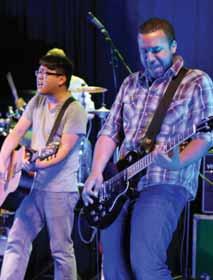
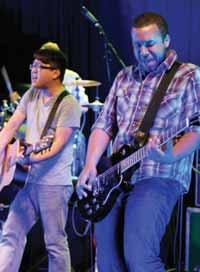
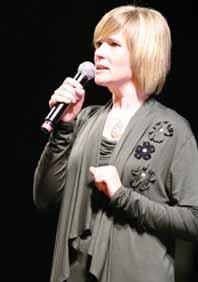
Students from another group described a time of deep sharing and bonding as they discussed areas of needed forgiveness.
Monday evening attendees had an opportunity to “be the hands and feet of Jesus” in a concrete way through an offering, a National Youth Conference tradition. This year’s offering, totaling about $3,000, establishes a scholarship fund so that youth from Latin American Mennonite Brethren Conference churches can travel to MB leadership training events.
When the much-anticipated, much-debated Claiborne took the stage, he challenged students to take their faith to new depths. Despite significant controversy before the event surrounding Claiborne’s selection as a speaker, he was well received. Two groups took advantage of the SA2011 organizers’ offer to provide a meeting place for youth groups who chose not to hear Claiborne.
Student reporter Austen Houts, from Bethany MB Church, Fresno, Calif., says, “I had heard (Claiborne) referred to as a ‘controversial’ and ‘radical’ speaker, so I was half anticipating

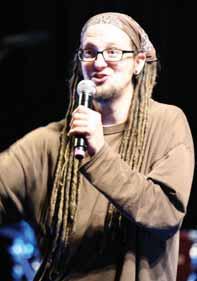




myself disagreeing with some of his ideas; however to my pleasant surprise this was absolutely not the case. He was an excellent example of being God’s hands and feet to those who need (God).”
Claiborne began his Monday evening address with the story of his own faith journey. “I’m still recovering from my conversion,” he said, saying that following Christ turned his life upside down. He told stories of working with lepers in Calcutta, India, learning what it means to share from a poor child, throwing a “kingdom party” in Philadelphia and getting arrested for feeding the homeless.
Christians should be “holy troublemakers,” he said, people who are not content with the world as it is but who dare to imagine the world as it should be.
During SA2011’s closing session Tuesday morning, Claiborne dreamed aloud about what it looks like to live a life marked by Christ’s love. He challenged attendees to be “extremists for love and grace” in a world of extremes. Again he made his point through stories,
taken from his own life, church history and the Bible. Claiborne encouraged this young generation of Mennonite Brethren to embrace their heritage, saying the world needs the Anabaptist voice of love and peace. He reminded them of Dirk Willems, an Anabaptist prisoner remembered for saving his captor at the cost of his own life. “That’s your story!” Claiborne said.
Claiborne’s closing story was a video of one of Mother Teresa’s Missionaries of Charity nuns touching and comforting a child suffering from malnutrition and post-traumatic stress. It served as a dramatic, wordless example of grace in the face of suffering and left the room hushed.
“I want to love like that, don’t you?” Claiborne asked.
With that challenge hanging in the air, youth groups huddled for communion, serving each other and praying together. As if in closing prayer, Stories in Braille led as students sang one final song: “Let justice and grace become my embrace. Consume me from the inside out, Lord.”—Myra Holmes with Connie Faber




t was standing-room only Sunday morning as attendees of SA2011 engaged in “heart training” through some 21 seminars and workshops aimed at capturing imaginations. Organizers hoped that the seminars and workshops would help students take their faith from “knowing it” to “loving it,” as codirector Wendell Loewen describes.
There was a topic for every interest: immigration, money, dating, missions, race relations and the Mennonite Brethren peace position, just to name a few. Each attendee could attend one seminar, aimed at a thought-provoking look at the topic, and one workshop, which offered a storytelling approach.
Organizers issued an invitation for workshop topics and presenters as part of their preparation, and a variety of presenters responded. MB Mission, the North American MB global mission agency, provided resource people for a number of mission-

related topics, some tied to specific locales such as Burkina Faso, Thailand and Portugal. U.S. Mennonite Brethren staff provided expertise for others, such as church planting, relational evangelism and social media. Others presenters came from USMB partners Mennonite Central Committee, MB Foundation, Tabor College and Fresno Pacific Biblical Seminary. USMB church planters, pastors and youth pastors also lent their knowledge and personal experience.
Judging from the crowded rooms, some of the more popular topics were “Good, Bad or Scared?” a seminar that offered specific tips for healthy dating relationships led by Linda Gehman Peachey, and “Everyday Radical,” in which Matt Ford spoke out of his family’s experience of moving to an urban neighborhood.
Student reporter McKayla Kleinsasser, from Bethel MB Church, Yale, SD, was challenged by Ford to see Jesus in everyday life. “I am excited to put into practice the ideas that were presented to us to bring transformation in the schools we attend, in the places we live and in the occupations we someday choose,” she says.
Another student in the same workshop found Ford’s discussion of salvation especially inspiring. “I accepted God’s salvation at this conference,” says Jalanea of Heritage Bible Church, Bakersfield, Calif. “I’m jumping in wholeheartedly, no hesitations. God is in control.”
Student reporter Kymberli Becker, a junior from Bakersfield, Calif., was surprised to learn that racial barriers still exist in the church when she attended “Race Relations,” a panel discussion on working together across such barriers. “The church should be the first to try and eliminate racial barriers,” she says. “It is up to our generation to try and solve this problem.”
After the late nights—or very early mornings— some of the students had, sleeping in could have been inviting, but they were out en masse for these workshops and seminars. “The Creed,” which explored the ancient creeds of the apostles, was packed, as was “Right Here, Right Now,” a look at the adventure of local mission.
In fact, almost every workshop or seminar was overflowing with attentive teens. They filled chairs, sat wall-to-wall on the floor and stood around room perimeters. Latecomers peered around doorways and spilled into hallways. If that’s any indication, this training was well-received.—Myra Holmes


“Aheart for service is part of our Mennonite Brethren identity,” SA2011 codirector Wendell Loewen told youth leaders during their orientation session. And that’s why Monday morning and afternoon were dedicated to ministry opportunities. “I want us to be a blessing to this city and to serve in whatever capacity we can,” said Loewen.
Organizers also hoped students would learn something. “We don’t want this to be just a service opportunity but also a learning opportunity,” said codirector Tim Neufeld.
Youth groups could elect to learn about the realities of the America’s urban poor, specifically those in San Antonio, in one of two ways: an educational and investigative City Search or a work or relational ministry assignment at one of 11 agencies. Local arrangements were handled by DOOR (Discovering Opportunities for Outreach and Reflection), an inner city ministry that provides short and long-term service opportunities in six U.S. cities including San Antonio.
Armed with packets detailing their assignment, youth groups left the Grand Hyatt at different times Monday to prevent congestion and minimize their impact on the city bus system. As part of the experience, many groups used public transportation to travel to their destinations.

City Search groups—a total of 232 people—traveled in three waves to either the predominantly Hispanic west side of San Antonio or the largely African-American east quadrant. City Search, an investigative three- to four-hour quest, utilized a set of questions that required groups to explore the city and go on-site to discover answers.


As part of her youth group’s City Search, student reporter Jackie Balzer, North Oak Community Church, Hays, Kan., visited a community center, an aquatic center and the neighborhood Catholic church. “Seeing these people devoting their lives to making things better for others and putting other’s interests before their own is such an inspiration,” she says.
A variety of San Antonio agencies provided an assortment of service assignments for 615 Mennonite Brethren volunteers. Students and their sponsors hosted a fiesta for developmentally handicapped adults, assisted with upkeep at the historic Martin Luther King Jr. Memorial Park, painted over graffiti, weeded community gardens, prepared meals, sorted products in a food warehouse, put in flooring with Habitat for Humanity, visited with residents at a nursing home and worked at community centers painting, mowing lawn, planting flowers and staining cupboard doors.
Gilbert Ayala, a junior from Madera Avenue Bible Church, Madera, Calif., spent the morning at a food bank. “We have pantries and refrigerators full of food but complain about not having anything to eat. We walk, drive or ride to the store and buy some more food when there are people who do not even know when the next time they are going eat is.”
Read Ayala’s and Balzer’s reflections—and those of other student reporters—online at www.usmb.org/student-journals. Students agree that their ministry opportunities made them thankful for ordinary things and increased their desire to serve their home communities.—Connie Faber

When Lithuania, like other former Soviet countries, gained independence after decades under communist rule, the country—indeed the whole region—began rediscovering individual freedom, market economy and faith. At the same time, a small, Christian liberal arts university with Mennonite Brethren connections opened its doors, ready to be a voice of hope and a catalyst for positive transformation in a rapidlychanging society. This year, LCC International University (LCC), Klaipeda, Lithuania, celebrates 20 years of preparing students to make a difference.
“Transformation is at the core of our mission,” says Marlene Wall, who has been involved at LCC since its founding and currently serves as interim president.
And because LCC is one of about 30 institutions of higher education around the world connected with the larger Mennonite Brethren family through the International Community of Mennonite Brethren (ICOMB), U.S. Mennonite Brethren are part of that transformation. ICOMB is a fellowship of 19 MB conferences from five continents.
While Lithuania’s independence has opened new
opportunities, “filters by which to judge those opportunities” haven’t necessarily kept pace, says Wall. Business is ruled by ruthless competition rather than cooperation, the country suffers from “brain drain” as many leave for work in other parts of Europe and human trafficking takes its toll on hope.
While Lithuania has no shortage of universities, LCC is the only Christian liberal arts university in the region. Wall says this uniquely positions the school to make a difference in the culture. LCC’s educational approach is based on interaction and critical thinking, unlike much of what is offered in Eastern Europe. It is relational—a community which fosters life-changing bonds. And it is Christ-centered, so that students gain not only excellent job skills but also a solid Christian foundation. “These are transformational and set our graduates apart from others who enter the job market,” says Wall.
The international educational experience LCC offers is also unique. About 60 percent of LCC’s 650 students come from Lithuania; about 40 percent are international students from 20 countries. Many are from nearby former Soviet countries; about 35 study

abroad students come to LCC each semester from North America.
LCC graduates return to their homes throughout the region and the world equipped with degrees and with changed lives. LCC offers bachelor’s degrees in business, English, psychology and theology and a master’s degree in Teaching English to Speakers of Other Languages (TESOL). The most popular major is business administration. “Certainly we teach the basics of accounting and finance and marketing and economics,” says Wall, “but we also want to be sure that our students get a strong foundation in ethics, integrity and Christ-centered values.”
Graduates find jobs in everyday places like banks, schools and local businesses and begin sharing the transformation they have experienced at LCC. And because Eastern Europe is still in transition, these students are poised to impact not only their local communities, but also the entire region.
Like the other ICOMB schools, LCC does its work of transformation in partnership with the church. “As a Christian university, we see ourselves as co-laborers with the church,” Wall says. She points out that church and school have unique roles—a school cannot replace the church nor can a church do the work of a school—but when they work together, the potential for transformation is greater. “Hand in hand, the church and the academy, when committed to the same kingdom-building goals through their individual design and purposes, can carry the good news in word and deed to the nations,” Wall says.
This month, representatives from LCC will join Mennonite Brethren educators from around the globe in delving deeper into that working relationship between church and school at ICOMB’s Higher Education Consultation in Winnipeg, Man. The event is a follow-up of a similar consultation hosted by ICOMB in Fresno, Calif., in 2007.
The theme for the June 13-17 event is, “Church and School: Companeros (co-laborers) in Growing People of God.” Because ICOMB will hold its annual meeting in connection with the consultation, national conference leaders

will participate with educators in the consultation.
“Throughout Christian history the schools of the church have been important contexts for training the next generation of Christian leaders for both the church and society,” says consultation organizer Dalton Reimer, Fresno, Calif. “This consultation is particularly significant in that it will bring together both church and school leaders to explore how the relationship between the two might be strengthened.”
Reimer, former dean of Fresno Pacific University and current educational facilitator for ICOMB, partnered with David Wiebe, executive director of ICOMB, in organizing the event. Reimer also spearheaded the 2007 consultation. The two were assisted by a steering committee comprised of Victor Wiens, MB Mission; Victor Wall, Paraguay; and Elmer Martens, Fresno, Calif.
Throughout the four-day event, attendees will hear and learn from other educators and church representatives from around the world. Wall says it’s easy to become “myopic”— focused on internal concerns and issues—and lose perspective. “It is at events such as this that we can connect and reconnect with our brothers and sisters in Christ who share a
common mission and from whom we can gain fresh ways of articulating the vision of Christian higher education,” she says.
An opening banquet will feature two U.S. presenters, Lynn Jost and Valerie Rempel, both of Fresno Pacific Biblical Seminary, the MB school for graduate-level theological education in Fresno, Calif. Other scheduled speakers include Wall; Alfred Neufeld, Paraguay; Mukawa Nzuzi, Democratic Republic of Congo; Johann Matthies, Germany; David Wiebe and Gerald Gerbrandt, Canada; and Arthur Duck, Brazil.
The 20 afternoon workshops will feature an interactive, storytelling approach. Workshops aim to result in specific recommendations for participants to take home to their various schools and church constituencies. Like speakers for the plenary sessions, moderators and storytellers for the workshops will come from around the globe.
Opportunities for informal sharing also abound as participants room together, share meals and explore Winnipeg during free times.
For more on LCC, visit http://www.lcc.lt/. For more on the Higher Education Consultation, see http://www.icomb.org/education.— Myra Holmes
Mennonite Brethren leaders from across the United States gathered in San Diego, Calif., March 7-13 for a series of discernment, networking and strategy meetings that included the National Pastors Orientation (NPO) Monday through Wednesday noon, a Board of Faith and Life (BFL) meeting Wednesday afternoon through Thursday afternoon, the National Leadership Summit (NLS) Thursday evening and Friday and the National Leadership Board (NLB) meeting Friday evening through Sunday noon.
A leadership team anchored by Valerie Rempel and Tim Geddert, Fresno Pacific Biblical Seminary professors, and Ed Boschman, USMB executive director, hosted 24 church staff and spouses for the NPO. The threeday event included worship times, lectures, informal presentations and discussions as well as social activities designed to help the pastors connect and to be better informed about the national USMB family.
The nine-member BFL discussed its ongoing work with the Canadian Conference BFL in addressing theological matters and affirmed a new document outlining how the BFL will serve as a “theological umbrella” for Fresno Pacific Biblical Seminary. The BFL also reviewed plans for publishing topical brochures, efforts to educate new pastors about MB theology and practice and the importance of facilitating a discussion about “living what we believe” as stated in the Confession of Faith.
The National Leadership Summit, hosted by the NLB and USMB staff, brought together lead staff and board chairs of all USMB ministry institutions and agencies. Each ministry partner—MB Foundation, Tabor College, Fresno Pacific University, Fresno Pacific Biblical Seminary and MB Mission—gave updates. Additionally, the district ministers and board chairs for each of the five district conferences (Pacific, Central, Southern, Latin America and North Carolina) reported. NLS participants also talked in small groups about barriers to achieving unity and oneness.
The National Leadership Board, chaired by Steve Schroeder of Hillsboro, Kan., met the last two days of
the week. “The Board is prioritizing the need to be even more effective in ‘getting the word out’ and ‘telling our story’ so as to develop a better informed constituency and also to clarify the added value that the U.S. Conference is to our churches,” says Boschman in summarizing the meeting.
The NLB approved a 2011-12 budget of $800,000, up from $734,136 for the current fiscal year. The board endorsed a procedure to follow when a congregation leaves the denomination and approved a three-month sabbatical for Mission USA director Don Morris. Dennis Becker from College Community Church, Clovis, Calif., was appointed to the Mennonite World Conference General Council; Jill Schellenberg and Laura Schmidt Roberts, both of Fresno, Calif., were appointed to the Mennonite Central Committee National Board.
The NLB discussed several items related to the recent shift in Mennonite Brethren seminary education, including representation on the Fresno Pacific University Board of Directors and the seminary’s Advisory Council. The Leadership Board approved the MB Biblical Seminary Inc., recommendation that approximately $1.1 million in endowment funds be distributed to four initiatives to assist in developing collaborative MB graduate theological education: $500,000 for student support, $100,000 for North American and international course development and $250,000 each to the U.S. and Canada. The Leadership Board also approved the recommendation that the U.S. funds be used to partner with Tabor College in the development of a graduate theological and pastoral training program.
The Leadership Board heard updates regarding church planting and church renewal, USMB communication efforts, the April national MB youth convention and Ministry Quest. Boschman reported on plans to develop closer relationships with Slavic-language congregations and to update the church-giving model, with the goal of having a new model ready for the July 2012 national USMB convention to be held in Omaha, Neb.— from USMB press release and minutes















Don Morris Mission USA director

For the past decade, Billy Hornsby, a pastor and church plant initiator who recently died, led one of the most successful church planting networks in the United States. He was known for believing in people and making them feel worthy. He was an encourager.
The story goes that when Billy was in eighth grade a math teacher yelled at him, “Hornsby, you will never amount to anything.” Billy later said that something inside of him died at that moment, and he stopped trying to be anything or anyone. When Billy was 19 and with a wife and daughter to support, he applied for a job at a large corporation in Baton Rouge, La. Part of the application process was taking an aptitude test. When a man from the company’s human resource department called and asked Billy to come in to talk about his score, Billy said, “Look, just tell me I failed it, and I’ll move on. Why waste your time and my time?”
But the man convinced him to come in anyway. When Billy met with him he once again blurted out, “I know I failed the test, so please just let me move on.”
The man looked at Billy and said, “Not only did you not fail the test, but you scored higher on the test than any one of the hundreds of people that have ever taken
this test.” And then he pointed his finger at Billy and said, “Hornsby, you know, if you apply yourself, you just might turn into something special.”
Billy said that was the moment his whole life changed back around. From that point on, the math teacher’s “curse” left him, and he went on to accomplish great things in life and for the kingdom of God.
I myself remember a coach who told me I was too small to play football, a game I loved. So I stopped playing. I remember another coach who told me I could do great things if I just believed in myself. I loved playing for that coach.
How many of us go through life never believing that God can use us for great things? I wonder if there are some amazing church planters, leaders, pastors, servers and helpers among us who believe they don’t measure up and so God can’t use them. Are there men and women who could lead but feel stifled by their low self-esteem? Maybe someone once said something derogatory. Maybe they feel scared or unworthy.
God uses imperfect people to do amazing things. He believes in us and wants to show us his vision for us! What if we also believe and go out and do it!
Maybe, just maybe, the kingdom of God will experience a powerful jolt.




It takes just 8 seconds for a ray of light to travel 93 million miles from the sun to the earth.




Phil Wiebe, associate pastor of South Mountain Community Church of The Springs in St. George, Utah, reports that over the past two years this Mennonite Brethren church plant has grown by leaps and bounds. The Springs, located in a predominantly Mormon (LDS) area, has seen many find new life in the true Jesus. Baptisms are common occurrences at The Springs.
Wiebe, who joined the church’s pastoral staff in October 2009, is involved in the development of small groups, assimilation of new attendees and oversees other staff.
WhenWiebe arrived on the scene, the church had recently been “adopted” by South Mountain Community Church in Draper, Utah, where Paul Robie is the lead pastor. At that time the weekly Sunday average attendance was 80 to 90 people. This Easter the church enjoyed record attendance of 415.
Becoming a part of the South Mountain family as well as being supported and subsidized by the Pacific District Conference and Mission USA provided this young church with much-needed momentum and tools for growth. Tom Mertz, The Springs lead church planter and teacher, continues to connect with Robie and the pastoral staff at the Draper campus on a weekly basis through emails and phone calls, even though the churches are almost 300 miles apart.
In early 2006 when Rod and Donna Anderson determined that God was calling them to plant a church in Sioux Falls, SD, they knew from experience that it would be a long, hard road. But this couple, having now started two new Mennonite Brethren churches, has been steadfast in their efforts over the past four years. Their work is paying off as they witness Christ Community Church grow, mainly by conversions.
“God has been very good. Two more (adults) received Christ as their personal Savior over the past two weeks (in addition to three people the previous month),” says Anderson. “We praise God for how he is building his church. Easter services went very well, with another opportunity to share the good news of Jesus Christ. Keep praying that God would grow his church!”
For the past two years the church has been using a building that was converted into a church facility by a different church plant. The congregation has two Sunday worship services due to attendance growth and space limitations as well as to provide an alternative time slot for attendees. This summer Christ Community Church will complete their Mission USA financial subsidy.
Both Rod and Donna are known and appreciated for their sometimes “slightly different” humor. But according to Rod, this keeps them sane and stable. “Church planting is hard enough, but if you can’t laugh once in a while, it gets even tougher,” he says.
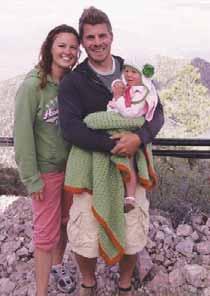


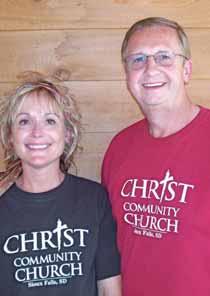

There are moments in my journey of motherhood when I wonder if I am cut out for it. Of course, there are times when I am frustrated, weary and I want nothing more than to lie down and sleep for a couple hundred hours. I somehow get through this. But what I am afraid I am not cut out for are the moments your heart holds so much love and loss you can hardly bear it. The times in which the weight of motherhood feels so beautiful and painful you can barely breathe. And one of those is the day that calls for letting your child go, when all you want to do is hold onto them a moment longer.
A year ago I was doing the seemingly impossible: walking my daughter to kindergarten. Somehow we had made it from baby to toddler to here. It was a long walk that sunny day as I held her hand and she bounced alongside me. As we rounded the corner to the classroom, I pressed her small body tightly to me, silently offering prayers of thanks and desperation, as I readied myself to let her go and watch her walk away.
I could feel the ache in my heart, as I was aware this was one of those “letting go” times of parenthood. A major one. The ties, which kept us bound so tightly together, were again loosening and stretching.
Stretching to make room for a teacher, friends and a life away from home and apart from me. I know it is a good choice for us, but something in me just wants to protect her from everything, keep her close and somehow stop her from growing up so fast.
Somewhere along the way I realized I have a daily choice to make. I can hang on to my children with all my might, fists clenched as I grip onto them out of fear and love and need. Or I can painfully, slowly open my hands and let them go, let them learn; let them live life…in all its joy and sorrow. The hardest thing to choose, of course, is to let go because this means you are no longer in control (which you really weren’t in the first place). It means you have faith that God is good and trustworthy. And for me, I have to wrestle with what “good and trustworthy” may look like and dig deep into the heart of the Father. It means you trust God will not only carry them but you as well, especially on those days when the weight of motherhood feels so heavy.
As I released the death grip I had on my daughter and watched her walk into kindergarten, I thought, “It begins.” We are now out of the gloriously difficult and wonderful
time of toddlerdom and into something entirely different. Evidently, after elementary school comes junior high, high school and then possibly something like college. I have heard it rumored these years pass in a blink of an eye. And so it begins.
Time will not slow down, and before I know it my daughter will be leaving our home—her home—ready to start a life away from us, away from me. And I realize whether you are walking your child to kindergarten or college, this act of surrender is painfully similar: You hold them tight, whispering prayers in love and loss, and then you open your hands and let go.
Amy Walker attends Trailhead Church, a Mennonite Brethren church plant in Centennial, Colo.


Pam Peters-Pries
On a recent vacation I browsed through several copies of Martha Stewart’s Living magazine from the library. Each issue was a feast of gorgeous photographs and spectacular ideas. Martha’s magazines are seductive. As I flipped through them, I dreamt of my friends’ accolades as I placed perfectly plated and garnished meals before them, the reputation I would earn for being “the hostess with the mostest.”
But then there were the haunting, darker thoughts: What if the Layered Spring Omelet didn’t stack up as prettily as in the picture? Would people notice if I used plain old table salt instead of the coarse sea salt listed in the recipe?
Reading Martha’s magazine, you start to think it’s not simply welcoming friends into your home that matters. It’s the effort and expense you incur to host them, and the impression you make with very tricky recipes that really counts.
I found an antidote for my Martha-induced anxiety from Doris Janzen Longacre, author of the More-WithLess Cookbook. Could Doris have foreseen how Martha Stewart would influence us when she said, in her gracious and lucid introduction, that the North American tendency to “feast nonstop can dull our festive joy . . . . We require more and more trimming to turn any celebration into a meal distinguishable from our daily diet.”
Or when she said: “Serving guests becomes an ego trip, rather than a relaxed meeting of friends around that most common everyday experience of sharing food. Gathering around the table in fellowship turns into entertaining.”

To learn more about Mennonites around the world, check out these two online resources:
• International Community of Mennonite Brethren (ICOMB), www.ICOMB.org, provides excellent information on each of the 19 MB conferences in 15 countries, resources such as the global MB Confession of Faith and news of cooperative efforts in outreach, mission and education—such as this month’s
Martha Stewart Living Omnimedia wouldn’t be the vast empire it is today if everyone heeded Doris’ timeless advice of 35 years ago: “Hold in clear perspective the reason for celebrating. Don’t expect food to be the total experience. More with less means affirming faith and relationships as the basis for celebrating, and letting food play a complementary role.”
If the world had a little more Doris Janzen Longacre and a little less Martha Stewart, we might all be enjoying our gatherings with friends a lot more with a lot less. The next time you’re fretting over those fussy garnishes and mismatched table settings, put that Martha Stewart magazine away and go back to your copy of More-with-Less.
Doris has some really, really good advice for you.
Pam Peters-Pries is a writer based in Blumenort, Man. This essay was first published in the April 2010 issue of Purpose, a monthly publication from Mennonite Publishing Network.
Now with more than 850,000 copies around the globe, Doris Janzen Longacre’s More-With-Less Cookbook, first published in 1976 by Herald Press, has become the favorite cookbook of many families. Full of recipes from hundreds of contributors, More-With-Less Cookbook offers suggestions “on how to eat better and consume less of the world’s limited food resources.” Herald Press published a 25th anniversary edition in 2003. Longacre died of cancer in 1979 at the age of 39 before she could complete the original manuscript of her second book, Living More with Less. This second book was published in 1980 and a 30th anniversary edition was released in November 2010.
Higher Education Consultation in Winnipeg, Man.
• Global Anabaptist Mennonite Encyclopedia Online (GAMEO), www.GAMEO.org, provides exhaustive, searchable information on Anabaptist-related topics such as history, theology, biography, institutions and local congregations. Mennonite Brethren are included in this larger Anabaptist family.


Steven and Dot LeClerc were received as members of North Oak Community Church, Hays, Kan., April 24.
Birch Bay Bible Community Church, Blaine, Wash., celebrated the baptism and membership of Nichole Morell and Alexis Burke April 3. Jack and Carolyn Teeter, Bryan and Laura Zollner, Jered and Kim Schouten, Skeeter and Barbara Wass, Terri Rudy, Terry Hee, and Steve Veldhuizen were also received as members. Dustin Reimer was baptized May 1.
Karen Kassel and Gene and Janet Carlisle were received as members of Community Bible Church, Olathe, Kan., April 3.
Doug Gosling, Amy Newman, Ralph Olais, Jillian Oliver, Jett Oliver, Myron Schoenfelder, Madison Shannon and Alex Wood were baptized April 24 at Laurelglen Bible Church, Bakersfield, Calif. Thomas and Michelle Cole, Mary Durling, Martha Gray, Joel and Shannon Lueck, David and Nancy Morrissey and Ken and Karen White were received as members March 13.
David and Amy Stone were received as members of College Community Church, Clovis, Calif., May 8. Adam Schellenberg and Ernst Vitovec were baptized and received as members March 13.
Jessica Waggoner, Anthony Lohmolder and Krissinda Redding-Hurst were baptized May 1 at Hesston (Kan.) MB Church
Cenzi Glanzer, Ethan Litwiller, Andrew Ulvestad and Anna Ulvestad were baptized and received as members April 24 at Bethel MB Church, Yale, SD.
Tanner Sechrist, Emily Sechrist, Cody Craney, Graham Pankratz, Clarie Heyen and David Dick were baptized Feb. 27 at Hillsboro (Kan.) MB Church
Ron Harton, Paul and Kimberly Quinn, Henrietta Siemens, Jim and Shirley Warkentin and Charles Wilkinson were received as members at North Fresno (Calif.) MB Church Feb. 13.
Doug and Marla Gilbert were received as members of Salem MB Church, Freeman, SD, March 20.
Shawnae Rasmussen, Samara Williams, Alexandria Easton, Rebecca Hansen, Nathan Foster, Abigail Allen, Shelby Madden, Kelly Madden, Connor Madden, Adam Hudgins, Heather Hudgins, Cadee Conner and David Conner were baptized March 13 at South
Mountain Community Church, Draper, Utah. Diana Roberts was received as a member of Memorial Road MB Church, Edmond, Okla., March 13.
Zack Belden and Brian Robinson were baptized March 20 at Mountain View Community Church, Fresno, Calif. Maddy Robinson, Dillon Robinson, Latasha Johnson and Veronica Flores were baptized March 13.
Lynn Kauffman has resigned as pastor of Amor y Fe, the Spanish-language congregation of Butler Church, Fresno, Calif. He and his wife, Mary, will continue in ministry until new leadership is secured.
Anthony Lind has accepted the position of associate youth pastor at Bethesda MB Church, Huron, SD.
Bruce Porter, formerly pastor of Buhler (Kan.) MB Church, has been appointed pastor of Lincoln Glen MB Church, San Jose, Calif.
Lance Burch is the new lead pastor at Shadow Lake Community Church, Papillion, Neb., effective June 1.
Brandt, Robyn Erleen, 66, Reedley, Calif., member of Dinuba (Calif.) MB Church, died Feb. 17, 2011. Parents: Victor and Ruby Becker. Spouse: Jim Brandt. Children: Steve, Cheryl Clyburne; five grandchildren.
Derksen, Elizabeth, 95, Dinuba, Calif., member of Dinuba MB Church, died March 2, 2011. Parents: Peter F. and Elizabeth (Klassen) Janzen. Spouse: Albert Derksen, deceased. Children: Diane Ruby, Karen Johnson; four grandchildren; four greatgrandchildren.
Gaede, Harold E., 90, Fresno, Calif., member of Butler Church, Fresno, died April 14, 2011. Parents: Henry and Agnes Gaede. Spouse: Marianna Suderman. Children: Sharon Hoard, Don, Paul, Ken; 12 grandchildren; seven great-grandchildren.
Harms, Susie, 88, Dinuba, Calif., of Dinuba MB Church, died Feb. 25, 2011. Parents: Cornelius and Anna Harms.
Heidel, Dianne J., 62, Hillsboro, Kan., of Hillsboro MB Church, died March 6, 2011. Parents: Harold “Spud” and Elda (Martens) Pschigoda. Spouses: Tom Tajchman, deceased; Larry Heidel. Children: Randy, Melody Davidson, Tammy Merrick; six grandchildren; one great-grandchild. Kasdorf, Hans, 82, Fresno, Calif., member of North Fresno MB Church, died March 26,
Salem MB Church, Bridgewater, SD, will celebrate 125 years of ministry in their community July 9-10 with a weekend of worship, food and reminders of a rich history. The festivities begin Saturday evening with a potluck, exploration of the church’s history, a message and the dedication of a time capsule. Jules Glanzer, who is from Salem MB and now serves as president of Tabor College, Hillsboro, Kan., will speak. Sunday’s schedule will continue the celebration with reflections from former pastors, a mass choir, an ethnic meal with zwiebach and jam and an offering to benefit the North Carolina MB churches. A catered meal will close the celebration. Salem began in 1884 when “10 souls” were baptized in the Little Vermillion River near Dolton, SD. By 1900, the growing congregation had dedicated their first church, which served as the center of a farming community. Throughout its history, Salem has been a sending church, commissioning missionaries, church planters and pastors. Among the current ministries with roots in Salem are: Bethel MB Church, Yale, SD; Dinuba (Calif.) MB Church; Emmanuel Church, Onida, SD; and the North Carolina MB churches. For more on Salem’s 125th anniversary, see www.salemmbchurch.com.


It was as simple as putting two and two together: Bethesda MB Church, Huron, SD, found itself with unused space in their youth building; a growing Hispanic congregation in town was quickly outgrowing theirs. So Bethesda now offers space for the New Jerusalem Church, rent-free. The Hispanic congregation consists primarily of workers from Mexico and Latin American countries drawn by lowerincome jobs at meat packing plants and other area industries. By supporting New Jerusalem, Bethesda increases potential ministry to the growing immigrant population in their area, since New Jerusalem will naturally be more effective in reaching Spanish speakers.
Community Bible Church, Olathe, Kan., broke ground March 27 for a new 300-seat worship center that will double the square footage of their current facilities. At the groundbreaking celebration, each person present helped turn the dirt in recognition that each must do his or her part. Some of the dirt was placed into a decorative container, which will be brought into the worship center at the first service as a reminder of God’s faithfulness. The congregation hopes to be using the new facility by Thanksgiving.

2011. He was a prominent MB missiologist and educator whose work was recognized beyond MB circles. Parents: Heinrich and Susanna Kasdorf. Spouse: Frieda Reimer. Children: Dianna LeVa, David, Evelyn Loewen; four grandchildren.
Nightengale, Mildred Mae Wedel, 89, Ringwood, Okla., member of New Hopedale MB Church, Meno, Okla., died Jan. 6, 2011. Spouse: Paul. Children: Delila, Grace, Maynard, Steve; 11 grandchildren; 19 greatgrandchildren.
Petker, Eleanor Mable, 82, Battle Ground, Wash., formerly of Corn (Okla.) MB Church, died Jan. 28, 2011. Parents: Barney and Anna Vogt. Spouse: Daniel Petker. Children: Arlene Franz, Janice Meier, Norm, Howie, Suzanne Marinace; 11 grandchildren; 11 great-grandchildren.
Schmidt, Tillie D., 88, Marion, Kan., member of Buhler (Kan.) MB Church, died March 3, 2011. Parents: Henry B. and Lena (Nachtigal) Regier. Spouse: Marvin Schmidt, deceased. Children: Sherylene; three grandchildren; four great-grandchildren.
Unruh, Leroy Norman, 80, Ringwood, Okla., member of New Hopedale MB Church, Meno, Okla., died Jan. 29, 2011. Spouse: Estileen Neufeld, deceased. Children: Lynette, Phil, Russell, Darrin; six grandchildren.
Wichert, Marion J., 90, Buhler, Kan., of Buhler MB Church, died April 19, 2011. Parents: J.C. and Eva (Karber) Wichert. Spouse: Anna Wedel. Children: Pearl Wassenaar, Earl, Dorothy Nightingale, Gaylen, LaVern, Shirley, Gary, Faye; 18 grandchildren; 13 great-grandchildren.
Vacation Bible school at Corn (Okla.) MB Church was a one-day event May 28, filled with Bible stories, crafts, games and music.
The adult and children’s Sunday school classes at Salem MB Church, Freeman, SD, held a “bring a friend” contest in May.
Mountain View Community Church, Fresno, Calif., offered a workshop on prayer training for kids May 7.
Youth from Corn (Okla.) MB Church, Bible MB Church, Cordell, Okla., Pine Acres Church, Weatherford, Okla., and Memorial Road MB Church, Edmond, Okla., joined for
a “Spring Fling” weekend retreat April 1517 at Morning Star Ranch, a World Impact facility in Florence, Kan.
Copper Hills Church, Peoria, Ariz., held an Easter egg hunt at a local park April 23.
Ventriloquist act “James and the Professor” was the special guest for Children’s Day May 1 at Kingsburg (Calif.) MB Church
Comedian Clinton Jackson headlined an event April 30 at Shorelife Community Church, Capitola, Calif. Funds raised went toward the church’s sponsorship of the Wharf to Wharf Race.
The Lao congregation of Butler MB Church, Fresno, Calif., invited the other congregations to join them in marking the Lao New Year April 16 with a “Lao Culture for Christ Revival” that included musical performances, singing, dancing and food.
Families were invited to participate in a palm branch procession April 17 at Memorial Road MB Church, Edmond, Okla.
Bethel MB Church, Yale, SD, showed the movie, “The Passion of the Christ,” on Good Friday. A children’s movie was also shown.
Once again, Shorelife Community Church, Capitola, Calif., offered a Good Friday prayer labyrinth. The labyrinth included stations designed to engage all five senses and reinforce the discipline of prayer.
Easter celebrations at Kingsburg (Calif.) MB Church included an April 21 foot washing service as a reminder to lovingly serve one another.
Artists at North Fresno (Calif.) MB Church were invited to display artwork with a “Journey to Easter” theme as the congregation prepared for Easter.
Hesston (Kan.) MB Church hosted “The Lord’s Lubers” April 16. Volunteers offered free oil changes for single moms, widows or those in need, and provided snacks for those waiting.
The Common Ground congregation of Butler MB Church, Fresno, Calif., hosted a pancake breakfast for the community during their normal service time April 10.
Volunteers from Laurelglen Bible Church, Bakersfield, Calif., read to children at a local elementary school two hours per week for five weeks this spring for “Read to Succeed.”
Volunteers at New Hopedale MB Church, Meno, Okla., made over 1,900 bierocks in two days to be sold at the local Mennonite Central Committee sale.
“Phillup the Truck” is at Neighborhood Church, Visalia, Calif., the first Sunday of each month. Attendees “fill up” the truck with nonperishable food items for a local ministry to the homeless.
Lincoln Hills Bible Church, Sioux Falls, SD, held its annual Operation Prom Dress giveaway March 19. High school girls who attended received free help with hair and make-up and a free prom dress.
Agency: U.S. Conference
The USMB Leadership Board is announcing a new staff position. The full time Director of Development will report to the Executive Director and will be responsible for coordinating PR initiatives and designing and implementing fund development programs while strengthening connections and relationships with churches and partner agencies throughout the national constituency. Resumes and questions may be sent to Ed Boschman at ebed@usmb.org. See http://www.usmb.org/director-ofdevelopment-job-description
Agency: University
Fresno Pacific University, a fully accredited independent Christian university in Central California, has open faculty positions in: Degree Completion, Criminology, Chemistry, Marriage & Family Counseling, Biology Lab Coordinator, Pastoral Ministry, History, Biblical & Religious Studies, Intercultural Studies, Academic Lang. Proficiency Services, Finance/Economics, School Psychology/Counseling, Mathematics, Field Supervisor/Coordinator, Communication, Sociology. Full job descriptions and applications at the Fresno Pacific University website: http://www.fresno.edu/hr
Local Church:
Senior Pastor: Fairview (Okla.) MB Church is seeking a senior pastor. Fairview is a rural community of 3,000 people in Northwest Oklahoma. Contact Mac Wahl , RR 1 Box 136, Fairview, OK 73737; Home 580-2273001 or Cell 580-227-0507; macwahl@pldi.net
Youth Pastor: Corn (Okla.) MB Church is looking for a youth pastor for 30-plus high school and 15-plus junior high youth. Unique, rural community; housing provided. New youth building and experienced youth sponsors. Contact Mark Graf at 580-450-2999, 580-3432613, mvgraf5@gmail.com, or mail to Rt. 1 Box 100, Colony, OK 73021
nabaptist Chr CMUUisanA
tiveec o be
tions es applica vit ngelica ies at , str elopment , dev finance , studen including academic angelic e based on Biblical pr v e and E Mennonit t ar ts tha th t will lead CMU in ac commitmen resideen he P T ersities tion tionofUniv e of M Associa rovinc y the P ed b er e istian univ t char
th its mission e with it Uinac danc anadain naccor 00 ain2008 olleges of C andC a eceive oba in 1998, and r anit
y 1, 2 July 1, 2012. ela nal r terx , and e planning ic pla keting teg t and mar olmen , enr e t lif n
ersee all aspec v , and will o tives angelical perspec oot inciples and r i ed lil
Winnipeg ed in t y loca ersit tionsh ed m hips. , admin tion and nistra aspe ts of CMU ec ed in Anabaptistn, visio ore on and c anada in 2008. membership in the peg as t w oba. I anit , M eg
ofile and other details can be f
w.cmu.ca/presiden w http:/w
ch C ear tial S residen , P Chairr, yoeppk on L R essions of in xpr tions or e Nomina
d y Blv tesbur 500 Shaf
ANAD , MB R3P 2N2 C Winnipeg
A full position pr essed t tialsearch@cmu.ca
ommittee d be addr est should tml ter ch.h.h t esidential_sear ound a otherdetailsccanbef o o:
presiden o: y email t t b Or sen











A Charitable Gift Annuity makes it possible for you to receive high returns on an asset for the rest of your life. Ultimately, the Gift Annuity results in a charitable contribution to the ministry of your choosing.
With the benefits of high payment rates, reduced taxes, and an ultimate gift to charity, it is easy to see why so many Mennonite Brethren already consider the Gift Annuity to be a win-win for themselves and the denomination.






You may select any 501(c)(3) organization as the ultimate beneficiary of your Gift Annuity, but we encourage you to help the Mennonite Brethren continue its legacy of faithfulness. Your gift to one of these ministries will help ensure a strong foundation for the next generation of Mennonite Brethren.





